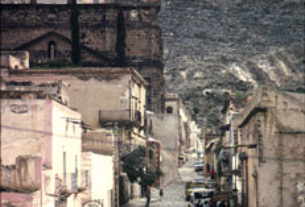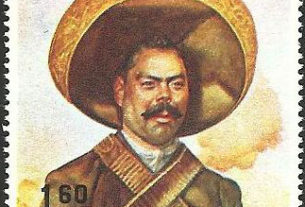Westwords
Edd Bissell, 64, almost retired as a Tennessee pharmacist and gentleman farmer, has found a new home, at La Cruz de Huanacaxtle, on the Bay of Banderas, on the left bank of Mexico, in the edge of Nayarit, not far north of Puerto Vallarta, between the last range of the Sierra Madres and the Pacific Ocean.
“If I had known there were places like this, I might have stopped working years ago,” said Bissell. “The sunsets are sensational.”
Because of Edd’s keen eye in measuring people, Rodolfo Calva Marquez, 35, has found a new home in Tennessee. He was the primary beneficiary of Bissell’s earlier dedication to roots. Edd stayed where he was long enough to open a door and point out the path to a potentially fantastic future.
What we have here is an accomplished gringo and a talented Mexican coming and going in opposite directions. One has discovered villagers who welcome strangers, the beauty of the Mexican coastline and the joy of fresh shrimp at 60 pesos per kilo. The other has beaten ridiculous odds, won a degree in electrical engineering and claimed a job with the Tennessee Valley Authority.
“I’ll earn more money in one year than my parents have made in their lifetime,” said Rodolfo.
This story started to take shape 12 years ago. Bissell was busy with his drug store and needed help on his New Market, Tennessee, farm. He asked a friend, Charlie Simpson, for suggestions.
“Charlie said there were 8000 illegal Mexicans within 25 miles of my farm.”
Edd figured that was a slight exaggeration but he listened
“Charlie said he’d find me some help. He said a father and son were working his tobacco crop and that he’d send them over when they finished.”
Jose Pablo Marquez and son Rodolfo showed up one morning at the Bissell farm.
“This was 1993,” said Rodolfo. “My daddy and I had been in the United States about 11 months. We worked in California and Florida before we got to Tennessee.”
The original motivation for slipping across the border was a chance at a better life, the possibility of earning enough dollars to send some home and save some for schooling.
“We came from La Colonia Esperanza, de la Ciudad Nezahualcoyotl, in the state of Mexico, outside Mexico City,” said Rodolfo. “I was born in the low-low class. Both my parents worked but we didn’t have anything, not a fridge, not even a radio.”
They didn’t find a pot of gold tied to the U.S.A. rainbow. There were times when father and son regretted the gamble. Life as migrant workers was hard. There was pain and soreness and sorrow.
“I forgot all about my desire to go to school.”
Bumping into Bissell was a blessing.
“I met Edd as he was trying to communicate with some others who had come to work for him a day earlier. They’d nod yes to whatever he said without having any idea what he meant.”
Rodolfo didn’t know much English, especially the Southern version, but he was valedictorian of that Mexican class. Edd saw his potential as a translator.
“That first day I experienced his generosity. He was the first to treat me not just as a worker but as a friend. He bought our meals and paid us a little more than what others had paid. He was curious about us as people, about why we were there. I explained as best I could.”
Bissell listened carefully when Rodolfo said he had wanted to be a priest.
“It didn’t take much genius on my part to recognize that this young man was sharp,” said Edd. “I didn’t want to see him spend his life picking tomatoes in Grainger County.”
The Marquez men stayed for a time, until Rodolfo said his dad’s fragile health dictated their return to Mexico.
“I asked if he’d be back,” said Bissell. “I’ll never forget what he said: That he would if he made it back across the border.”
Bissell suggested Rodolfo try for legal status.
“He offered to help me. His conditions were clear. He asked honesty, dependability, hard work and reliability. I did not think he was asking too much. My parents had instilled those same values.”
“Edd made this final point very clear: ‘If I ever discover you are telling me tales, you hit the road. There’ll be no second chances.'”
Looking back, Marquez knows this was the first, best chance of a lifetime, free lodging, pay for work and help toward legal residence.
“Edd even promised to find me a rich, fat woman to keep me warm during the winter. He never came through on that.”
Rodolfo delivered his dad back to Mexico and, for the second time, slipped into the United States. He hitchhiked to Tennessee, to New Market, to the Bissell farm.
“Edd put me to polishing my language skills.”
“I pushed him into a GED test. He scored in the 99 percentile.”
It took Bissell most of a year and some serious political arm-twisting to get Rodolfo into college, Walters State Community College, in Morristown, Tenn.
Once enrolled, Rodolfo was dispatched to Mexico to obtain a student visa.
“School officials outlined the requirements, the paper work and the costs. When I returned, I was crushed to learn that tuition was $2500 instead of $800. They had quoted me in-state figures instead of out-of-state.”
Bissell advised Rodolfo to invest what he had in summer school and said he would be looking for other help. Some came from the Hispanic ministry at a Catholic church. Some came from Rodolfo’s extra jobs in a Mexican restaurant and as a tutor in Spanish.
“He did all that and maintained a 4.0 average in school,” said Bissell.
How did he do it?
“I don’t know,” said Rodolfo. “I knew this was my one great chance and I really went for it. I wasn’t scared by the thought of hard work or sacrifices. I’d already been through that.”
Bissell hit a home run as a fund-raiser. An old friend, Z Buda, the college’s largest donor, granted Rodolfo Calva Marquez a full scholarship. Rodolfo sent a thank-you note. Z was stunned. He had given away bundles to help others and this was only the second acknowledgment he ever received.
Bissell said maybe Z had been giving his money to the wrong people.
Rodolfo graduated magna cum laude. He made two Bs, in a physics lab and in a physical education class, the basics of golf.
“He borrowed our daughter’s clubs,” said Bissell. “No wonder he made a B.”
Bissell arranged a transfer to Tennessee Technological University.
“Higher education meant higher tuition,” said Rodolfo. “Edd said to stop worrying about money.”
The school awarded him a part-time job and a partial scholarship. He found classes far more challenging. His grades slipped some.
“I took a year off to work for a textile company. When I returned to school, it was even harder.”
Bissell told Rodolfo to concentrate on learning instead of earning. He found new sources of funding. He also persuaded the school to create a job in international student affairs.
“He loaned me enough to make it the rest of the way.”
Rodolfo became president of the university honor society. He got his degree in electrical engineering in 2002. He responded when TVA sent two engineers to the college to interview prospective employees.
“One just happened to know Edd Bissell. I am pretty sure that tipped the balance in my favor.”
Rodolfo thinks he was pretty lucky to have met Edd and Nancy Bissell.
“Without them, I’d still be working in the fields or, at best, in a factory. As it is, I am enjoying a way of life I didn’t even know to dream about.”
Rodolfo says Bissell always gave him the best half of any bargain.
“I had more than a good deal at the farm. He introduced me to his friends and spoke positively about me. When I faced an unknown situation, he knew what to do about it.”
“He encouraged me to do things on my own but when I got as far as I could go, he’d step in for the final mile. When I tried to express my gratitude, Edd and Nancy would say I did it all on my own, that all they gave me was a chance.”
Bissell asked and then answered this question: Who got the better deal, Rodolfo or me?
He said he has long appreciated honest people who’ll work for what they want. He says they are all around his new home on the beach.
“They do such a nice job at our condo complex. I took the whole staff to lunch the other day as a way to say thank you. It cost $80 but the smiles were worth a fortune.”
Bissell sold his drug store. The farm and other holdings are for sale.
“In my mind, I live in Mexico. I walk to the village and back, more than two miles. My weight is down from 192 to 168. It would be less except for the breakfast buffet that costs 27 pesos.”
The Bissells spend $20 a week for fresh fruit, vegetables and other basics. The cost goes up when they add shrimp and lobster.
“I’ve met many Mexicans who know more English than I know Spanish. I’ve seen many who get by with almost no money. Their homes are quaint. They cook outside. They sleep in hammocks. Their lifestyle seems primitive but they seem happy.”
Edd Bissell seems very happy. He drives his redneck Chevrolet pickup truck and tries to return every smile and wave he sees.
“This is home. When I go back to East Tennessee, I’m just visiting.”


